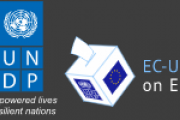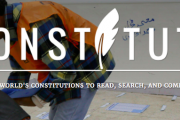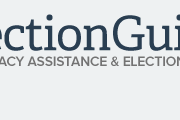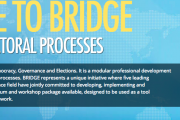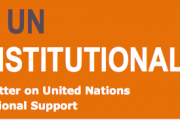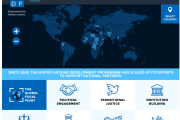Democratic Governance
Establishing and strengthening inclusive political processes aims to improve the participation and political influence of citizens, make governments and institutions more accountable, and build a stronger and more inclusive social contract. Inclusion is a central tenet in the 2030 Agenda, most notably through SDG 16, SDG 10 and SDG 5. An inclusive political process is an integral component of conflict prevention efforts. Political processes include strengthening rule of law mechanisms, facilitating constitutional reform processes, providing electoral cycle support, and parliamentary development.
Rule of Law
In crisis and conflict-affected contexts, particularly those with a legacy of political violence or undergoing complex political transitions, establishing the rule of law is essential to preventing the outbreak or recurrence of conflict. Strengthening the rule of law through security and justice services that are inclusive, governed effectively, empower women to access justice, counter impunity, and follow international standards is critical for driving development. Strengthening of the rule of law furthermore needs to emphasize confidence building between society and the state. This can be done through assisting national authorities in achieving quick wins through immediate restoration of service delivery, as well as delivering on comprehensive, sector-wide reforms that are inclusive and prioritize national ownership for long-term sustainability.
Elections
Elections are a vital part of democratic processes including, political transitions, implementation of peace agreements and consolidation of democracy. Elections provide a critical intersection between citizens and the interlinked goals of poverty alleviation, human development, and ultimately, the achievement of the SDGs. The political legitimacy that credible elections confer is essential for healthy states and provide a crucial mandate if governments are to have the capacity to tackle the multitude of sustainable development challenges.
Preventing election violence goes beyond the organization of free and fair elections. Peaceful elections are no guarantee for democratic quality, while free and fair elections are no guarantee for election security. The methods and tools to prevent election violence vary widely in terms of the implementing actor, timing, or scope and often include specialized early warning systems and recurring risk assessments. Early changes to electoral laws may be authorized domestically years before voters hit the polls to improve access to and fairness of the voting process. Preventive measures can be taken by local government authorities, as they carry the primary responsibility for the transparent and peaceful organization of elections. Political parties, local media, and domestic NGOs, such as youth organizations, may play a constructive role as well, as long as governing authorities allow them the space to operate. The practice of election violence prevention also targets different groups and individuals, depending on risk assessments in particular contexts.
Access the Electoral Knowledge Network

The ACE Electoral Knowledge Network provides comprehensive and authoritative information on elections, promotes networking among election-related professionals and offers capacity development services.
Parliamentary support
Effective political institutions such as parliaments and political parties are central to advancing strong systems of democratic governance. Parliaments can be powerful agents of change, particularly during and after times of crisis and are essential to a vibrant democracy, maintaining peace, upholding the rule of law and human rights, promoting gender equality, advocating for inclusive politics, increasing economic prosperity and promoting social justice. Accordingly, parliaments must be well structured, resourced and empowered to effectively fulfil their mandate.
Parliamentary support includes building the capacities of Members of Parliament to discharge their constitutional law-making, oversight and representation mandates, as well as increasing the capacities of civil society actors to act as intermediaries in political advocacy.
AGORA is the leading portal for the parliamentary development community, connecting international organizations, parliamentary development experts, but also Members of Parliament, parliamentary staff, NGOs and civil society organizations active in the field of parliamentary development.


